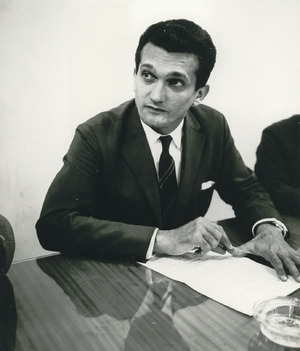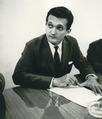Celso Furtado facts for kids
Quick facts for kids
Celso Furtado
|
|
|---|---|

Celso Furtado in 1962
|
|
| Minister of Planning | |
| In office 28 September 1962 – 31 March 1964 |
|
| President | João Goulart |
| Preceded by | Office established |
| Succeeded by | Roberto Campos |
| Personal details | |
| Born | 26 July 1920 Pombal, Paraíba, Brazil |
| Died | 20 November 2004 (aged 84) Rio de Janeiro, Rio de Janeiro, Brazil |
| Alma mater | University of Paris |
| Academic career | |
| Institution | University of Cambridge, CEPAL, Sudene, Cabinet of Brazil, University of Paris |
| Field | Economics |
| School or tradition |
Structuralist economics |
| Influences | John Maynard Keynes, Raúl Prebisch |
Celso Monteiro Furtado (born July 26, 1920 – died November 20, 2004) was a very important Brazilian thinker and economist. He studied why some countries are rich and others are poor. He especially focused on how to help poorer nations grow and overcome poverty.
Celso Furtado is known for his ideas on "economic structuralism." This idea suggests that governments should play a big role in helping their country's economy develop. He worked with Raúl Prebisch at an organization called CEPAL. Their ideas were popular in Latin America in the 1960s and 1970s. They believed that governments should get involved to help their economies grow, inspired by the ideas of John Maynard Keynes.
Besides being an economist, Celso Furtado also worked as a politician. He served as the Minister of Planning and later as the Minister of Culture in the Brazilian government.
Celso Furtado's Life Story
Celso Furtado was born in Pombal, a city in the dry region of Paraíba, Brazil. In 1939, he moved to Rio de Janeiro to study law. He finished his law degree in 1944.
That same year, he joined the Brazilian Expeditionary Force. He fought in Italy during World War II alongside the Allied forces. Seeing how countries were destroyed after the war made a deep impression on him. This experience led him to decide he wanted to study Economics. In 1946, he started his doctorate in economics at the University of Paris (Sorbonne). His main project was about Brazil's economy during the time it was a colony.
In 1949, Celso Furtado moved to Santiago, Chile. There, he joined a new team at the United Nations Economic Commission for Latin America and the Caribbean (known as CEPAL). The head of CEPAL was an Argentine economist named Raúl Prebisch. At CEPAL, Furtado and Prebisch were key in creating new plans to help Latin American countries develop. They believed in building more industries and making goods at home instead of buying them from other countries.
When he returned to Brazil in 1959, he published his most famous book. It was called The Economic Growth of Brazil: A Survey from Colonial to Modern Times. Soon after, he became a director at the Brazilian Development Bank. He focused on helping the poor northeastern region of Brazil, which often faced droughts.
During this time, he created a plan that led to the creation of Sudene. Sudene was a government agency set up to boost economic growth in the Northeast. Brazilian president Juscelino Kubitschek appointed him as Sudene's first director. Later, under President João Goulart, Furtado became the Minister of Planning. He was in charge of Brazil's three-year development plan.
Celso Furtado also helped start the United Nations Conference on Trade and Development (UNCTAD) in 1964. This group works on issues related to development and fair international trade.
In 1964, there was a military takeover in Brazil. Celso Furtado was forced to leave the country. He became a professor at Yale University in the United States. Later, he taught at Cambridge University and the University of Paris in France.
In 1979, a new law allowed him to return to Brazil. He then served as Brazil's Ambassador to the EEC (a European economic group) from 1985 to 1986. He also became the Minister of Culture under President José Sarney.
In 2004, Celso Furtado was nominated for the Nobel Prize in Economics.
Images for kids
See also
 In Spanish: Celso Furtado para niños
In Spanish: Celso Furtado para niños
 | Frances Mary Albrier |
 | Whitney Young |
 | Muhammad Ali |


